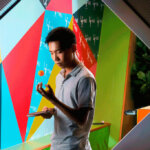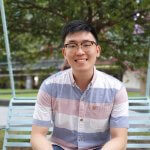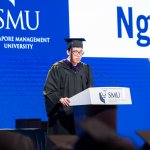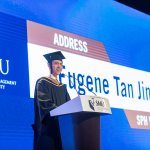By the SMU Social Media Team
Brandon Lum’s first encounter with the Singapore Management University’s (SMU) interactive pedagogy happened when he was still in Junior College. Similar to fellow Class of 2019 graduate, Eugene Tan, Brandon was a H3 Economics student and also took a module called “Game Theory and Competition” at SMU. He found himself drawn to the seminar-style classroom discussions between students and professors.
“There was a good professor-to-student ratio, and students were constantly encouraged to voice their perspectives. That helped me to become a more confident speaker and kept me intellectually engaged, which I found was key to finding fulfilment in my learning,” he recalls.
Eventually, Brandon joined SMU’s Bachelor of Science (Economics) programme and graduated in 2019 where he was named the School of Economics’ DBS Bank School Valedictorian. He is now pursuing a career as an actuary in a life insurance company, and maintains his passion for dance by taking part in public performances and dance battles.
In our recent interview with Brandon, these are some of the reflections he shared:
What was your favourite module at SMU?
Economic Development in Asia, an SMU-X module by Associate Professor Madhav S. Aney. We examined poverty traps in less developed countries and analysed the effectiveness of various interventions in addressing the needs of the poor. It helped me distinguish between interventions that may be a waste of money and those that are simple yet cost-effective. It renewed my hope that poverty can be eradicated if done right.
During this module, we also worked with community-based addiction recovery centre We Care Community Services, to develop a Social Impact Report assessing the monetary impact of work done for every dollar received. We had to interview recovering individuals to understand the difficulties they faced in overcoming addiction, and eventually presented our report in front of We Care’s board members and other distinguished guests. Knowing that our work as students was highly valued by industry professionals and could make a real impact on society, made this module even more unforgettable.
What were two key skills you picked up at SMU?
The first is the skill and courage to speak up. The need to constantly participate in class has developed my confidence in presenting my ideas to others, even if I may be wrong or my perspective may be an underdeveloped one. We can all learn from one another if we choose to exchange opinions, but this can only be done if we speak up.
The second is time management skills. SMU generally requires fewer hours of in-class time per module, which means we have unrivalled flexibility for managing our schedules. With this greater freedom comes greater responsibility to use the time well, and planning your time efficiently gives you work-life balance while also allowing you to achieve your goals.
What co-curricular activities did you take part in and what did you learn from them?
I was the president of the Actuarial Science Club, a CCA that focused on my key interest and intellectual passion. Through the club, I got to be part of the Singapore Actuarial Society Education and Career Committee, and helped drive initiatives to help students and professionals gain wider learning and career opportunities related to the actuarial profession.
I was also a dancer in SMU Funk Movement, which I chose because it specialises in freestyle dance—dancing spontaneously to music without any planned choreography. In my Junior year at SMU, I also took part in an international student exchange programme to Seoul, a choice of destination largely motivated by the vast dance opportunities there. During the trip, I had the privilege of learning from some of the world’s best dancers over the course of four months and the experience cemented my lifelong passion for dance.
I also travelled to Jaipur, India, for a two-week overseas community service project titled, Project Vikasa II. The project aims to empower marginalised women with personal financial management skills. Although we thought our impact would be limited due to the short time we had, we were pleasantly surprised when some of the women proudly showed us their personal expense tracking notebook just a few days after we taught them the importance of budgeting their monthly income. It taught me that every effort to change others’ lives counts, no matter how small the impact may seem.
How did studying at SMU challenge you both academically and personally?
Unlike in earlier education phases where we only had to learn within a given syllabus and tackle certain types of questions in exams, my SMU modules often challenged me to gain a thorough appreciation of concepts in a wider context. Notes and textbooks were often insufficient, so I had to do my own further research and engage in intellectual discussions with my peers and professors in order to maximise learning.
At the same time, I had difficulty juggling my commitments. At one point, I had several mid-term papers and external exams to prepare for, as well as intense training for a dance production. Plus, I had groupmates who wanted to start work early on our projects. Tackling these challenges involved balancing conflicting commitments, and sometimes reassessing which ones should be dropped.
If you could go back in time, what is one piece of advice you’d give your undergraduate self?
I would tell myself not to be overly influenced by what everyone else is chasing in their university lives. While it is important to consult the people around you about your modules, majors and CCA options, it is way more important to follow your heart and ask yourself what makes you happiest. Instead of pursuing society’s definition of success and following the crowd, seek your own passions (and keep exploring if you don’t have a passion) and fulfilment will come.
Received your SMU Admissions offer? Common acceptance closes 24 May 2020. Accept your offer today.









One thought on “Insights From an Insider: Brandon Lum, Economics School Valedictorian 2019”
Brandon and his fellow students did a thorough and rigorous study at our addiction treatment centre, WE CARE Community Services. It is a fine example of how economics can be applied to ascertain the value a social service agency returns back to society.
We wish everyone who participated in the study good luck. Stay healthy – there’s immeasurable economic value in it!